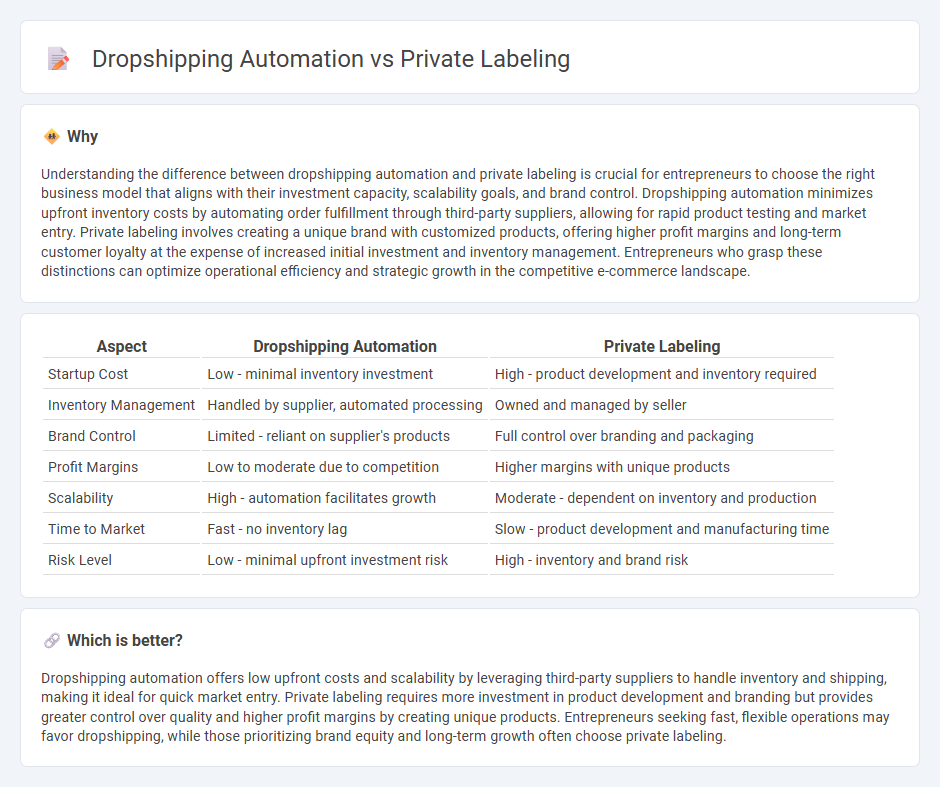
Dropshipping automation streamlines order fulfillment by outsourcing inventory management and shipping, reducing upfront costs and operational complexities for entrepreneurs. Private labeling involves creating unique branded products by partnering with manufacturers, offering higher profit margins and greater control over product quality and branding. Explore the advantages and challenges of both models to determine the best fit for your entrepreneurial goals.
Why it is important
Understanding the difference between dropshipping automation and private labeling is crucial for entrepreneurs to choose the right business model that aligns with their investment capacity, scalability goals, and brand control. Dropshipping automation minimizes upfront inventory costs by automating order fulfillment through third-party suppliers, allowing for rapid product testing and market entry. Private labeling involves creating a unique brand with customized products, offering higher profit margins and long-term customer loyalty at the expense of increased initial investment and inventory management. Entrepreneurs who grasp these distinctions can optimize operational efficiency and strategic growth in the competitive e-commerce landscape.
Comparison Table
| Aspect | Dropshipping Automation | Private Labeling |
|---|---|---|
| Startup Cost | Low - minimal inventory investment | High - product development and inventory required |
| Inventory Management | Handled by supplier, automated processing | Owned and managed by seller |
| Brand Control | Limited - reliant on supplier's products | Full control over branding and packaging |
| Profit Margins | Low to moderate due to competition | Higher margins with unique products |
| Scalability | High - automation facilitates growth | Moderate - dependent on inventory and production |
| Time to Market | Fast - no inventory lag | Slow - product development and manufacturing time |
| Risk Level | Low - minimal upfront investment risk | High - inventory and brand risk |
Which is better?
Dropshipping automation offers low upfront costs and scalability by leveraging third-party suppliers to handle inventory and shipping, making it ideal for quick market entry. Private labeling requires more investment in product development and branding but provides greater control over quality and higher profit margins by creating unique products. Entrepreneurs seeking fast, flexible operations may favor dropshipping, while those prioritizing brand equity and long-term growth often choose private labeling.
Connection
Dropshipping automation optimizes order fulfillment by integrating inventory management and supplier communication, reducing manual tasks and enhancing efficiency. Private labeling leverages this automation to customize products without handling physical stock, enabling entrepreneurs to build unique brand identities while scaling operations seamlessly. Together, they streamline business processes, increase profitability, and accelerate market entry in the e-commerce sector.
Key Terms
Inventory Management
Private labeling automates inventory management by allowing businesses to stock customized products under their brand, ensuring control over product availability and quality. Dropshipping automation relies on third-party suppliers to fulfill orders directly, minimizing inventory holding but increasing dependency on supplier accuracy and shipping times. Explore the advantages of each method to optimize your e-commerce inventory strategy effectively.
Branding Control
Private labeling offers full branding control by allowing businesses to create unique product packaging and customize their brand identity, leading to stronger customer loyalty and market differentiation. Dropshipping automation reduces inventory risks and operational tasks but limits branding opportunities since products are typically sold under the supplier's brand. Explore deeper insights to understand how each model impacts your brand's growth strategy.
Fulfillment Process
Private labeling offers greater control over product quality and branding throughout the fulfillment process, often involving inventory management and direct shipping from warehouses. Dropshipping automation minimizes upfront inventory costs by partnering with suppliers who handle storage and order fulfillment, enabling faster scaling but less control over the delivery timeline. Explore the differences in fulfillment strategies to determine the best fit for your e-commerce business model.
Source and External Links
What Is a Private Label? How Private Labels Work in 2025 - Shopify - Private labeling is when a company sells products manufactured by a third party under its own brand, allowing retailers to offer exclusive items and control branding and marketing while outsourcing production.
Private label - Wikipedia - A private label is a brand owned by a company but produced by another, often exclusive to that company, commonly seen in store brands that compete with national brands.
Private Labeling vs. White Labeling: What's the Difference? - Indeed - Private labeling allows for product customization and exclusivity, which helps retailers differentiate their offering, increase pricing control, and improve profit margins versus white labeling.
 dowidth.com
dowidth.com